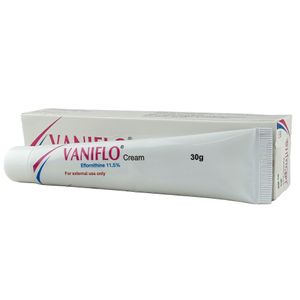Vaniflo Uses, Dosage, Side Effects and more
Vaniflo prevents hair growth by inhibiting the anagen phase of hair production. This occurs by eflornithine irreversibly binding (also called suicide inhibition) to ornithine decarboxylase (ODC) and physically preventing the natural substrate ornithine from accessing the active site.

| Attribute | Details |
|---|---|
| Trade Name | Vaniflo |
| Generic | Eflornithine |
| Eflornithine Other Names | alpha-difluoromethylornithine, DFMO, Eflornithine |
| Weight | 13.9% |
| Type | Cream |
| Formula | C6H12F2N2O2 |
| Weight | Average: 182.171 Monoisotopic: 182.08668396 |
| Groups | Approved, Withdrawn |
| Therapeutic Class | Hair Growth Inhibitor |
| Manufacturer | Unimed Unihealth MFG, Ltd |
| Available Country | Bangladesh |
| Last Updated: | January 7, 2025 at 1:49 am |
Uses
Vaniflo Hydrochloride cream, 13.9% is used for the reduction of unwanted facial hair in women. Vaniflo Hydrochloride has only been studied on the face and adjacent involved areas under the chin of affected individuals. Usage should be limited to these areas of involvement.
Vaniflo is also used to associated treatment for these conditions: Meningoencephalitic stage Trypanosoma brucei gambiense infection, Hair removal therapy
How Vaniflo works
Vaniflo prevents hair growth by inhibiting the anagen phase of hair production. This occurs by eflornithine irreversibly binding (also called suicide inhibition) to ornithine decarboxylase (ODC) and physically preventing the natural substrate ornithine from accessing the active site.
Dosage
Adults: Apply a thin layer of Vaniflo cream, 13.9% to affected areas of the face and adjacent involved areas under the chin and rub in thoroughly. Do not wash treated area for at least 4 hours. Use twice daily at least 8 hours apart or as directed by a physician. The patient should continue to use hair removal techniques as needed in conjunction with Vaniflo (Wonica should be applied at least 5 minutes after hair removal). Cosmetics or sunscreens may be applied over treated areas after cream has dried.
.Elderly: No apparent differences in safety were observed between older patients and younger patients.
Children: The safety and effectiveness of this product have not been established in pediatric patients less than 12 years of age.
How Long Does It Take to Work?
How Long Does It Take to Work? see here Vaniflo
Side Effects
Adverse events were primarily mild in intensity and generally resolved without medical treatment or discontinuation of Vaniflo. Side effects can include acne, barbae, pseudofolliculitis, stinging skin, headache, burning skin, dry skin, erythema (redness), pruritus (itching), tingling skin, dyspepsia, skin irritation, rash, alopecia, dizziness, folliculitis, hair ingrown, facial edema, anorexia, nausea, asthenia, vertigo.
Precaution
For external use only. Transient stinging or burning may occur when applied to abraded or broken skin.
Interaction
It is not known whether Vaniflo has any interaction with other topically applied drug products.
Food Interaction
No interactions found.Half Life
8 hours
Elimination Route
Renal
Pregnancy & Breastfeeding use
Pregnancy Category C. It is not known whether or not Vaniflo Hydrochloride is excreted in human milk. Caution should be exercised when Vaniflo is administered to a nursing woman.
Contraindication
Vaniflo is contraindicated in patients with a history of sensitivity to any components of the preparation.
Special Warning
Store at 25°C, excursions permitted to 15°C-30°C. Do not freeze.
Acute Overdose
Overdosage information with Vaniflo is unavailable. However, if very high topical doses (e.g., multiple tubes per day) or oral ingestion has been encountered (a 30 gm tube contains 4.2 gm of Vaniflo Hydrochloride), the patient should be monitored, and appropriate supportive measures should be administered as necessary.
Storage Condition
Store at 25°C, excursions permitted to 15°C-30°C. Do not freeze.
Innovators Monograph
Vaniflo contains Eflornithine see full prescribing information from innovator Monograph, MSDS, FDA label



